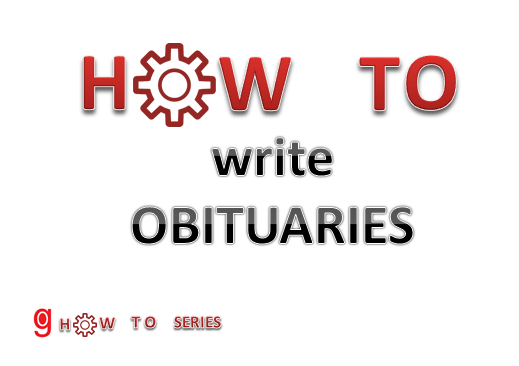How to write Obituaries

An Indian’s Context
Dedicated to all those striving to make a Living.
“How To” books are available aplenty in the market. The current (Covid19) pandemic has rendered many amongst us jobless, if not, paranoid. I am no exception.
I was thinking a lot about what can I do to make people ‘learn‘ from me. I thought a lot and then, I strongly realized that I had nothing that I am good at, which people will heed an ear, leave alone learn from. After some reinforcements, I came across this idea of teaching people on “How To” write an Obituary. At least now, you should agree that I am doing something noble.
Alfred Nobel
Yes, this article too comes from the same beginnings, or should I say “Obituary”, i.e., Alfred Nobel story of the Nobel prizes fame.
For the sake of those, who want the story to be (re)told, here it is.
When Alfred Nobel, a richy-rich man did not die, but the newspapers – out of mistaken identity, published an obituary, Nobel didn’t like it the least. He was portrayed as an arms-dealer and death-merchant, which he was. To re-write his obituary (while he was alive), Nobel had to transform himself into the greatest philanthropist. Thus, the obituary and of course his “Nobel” prizes stand out to all of us as a life-lesson.
How To
Coming to our learning on How to write an Obituary, I have a few very important points that one should know and remember.
Here too, I am sure, I shall not be spared from plagiarism. There are some of those sites from the west, where the departed are taken care of. To escape their brunt, here I have added ‘An Indian Context’.
Death
An important lesson from Alfred Nobel, before writing the obituary, the person – or let’s call him or her as the subject, must be dead. If he or she is still alive at the time of publication of the obituary, do not falsify the obituary, but take all measures to prove your statement right. First, kill him/her.
Communication
Obituary can be multilingual or multi-modal, to reach the maximum audience. Recently, we were watching a movie in which a lead character was inquiring innocently, whether Gandhi (Mahatma) had died. Maybe, he would not have read the obituary. Reading history has anyways become old-fashioned. Modes of communication be as many as possible. After all, how else could we engage those making flex-banners and posters with jobs. WhatsApp forwards and Facebook posts have a set of standard responses that RIP the purpose of such obituaries.
Name
Get the name right. You may use as many aliases and lineages to clarify and ensure that all fingers point to the right person (subject). If people land up at the wrong door, obviously, we may again have to resort to the measures already elicited earlier, in the para on Death. Kill him or her too.
Language
Keep the language plain and simple. Unlike my write-ups, keep it crisp. Convey the basic information. Ornamental language in the obituary or on the epitaph may show high airs, but will not solve its purpose, i.e., telling people about the person (subject).
Do not seek help from the likes of Shashi Tharoor, or else, you will end up spending more efforts in explaining or on supplying dictionaries than on obituary itself.
Truthful
A very difficult one. Write only the truth. While still alive, people gossip on our backs. When dead, they’ll lash out their tongues if the obituary is not close to truth. It spreads faster than wild-fire. A bad publicity for the departed person (subject), and also to you. To give you some comfort, you may write the truth and perceived truth.
Credits Only
When it comes to economics/accounting, only a Giver is regarded a human being. Obituary must contain only the philanthropic (Giving) deeds, if any. Ignore this point if he or she hadn’t done anything worthwhile in this area. Remember the point on truthfulness. If the person died as a loser-financially or bankrupt, avoid mentioning his or her economic status. Discuss credits only, not debits.
Love
All for Love and Love for All. Love is the only glue that bonds people at all times. Love doesn’t wither out. Do not forget to mention how loving the person (subject) was to his fellow human beings, including friends and family. The adjectives need not always be superlatives. Moderate them. A small degree of exaggeration will be acceptable, since the person (subject) is gone and cannot have any material gains now.
Not a Third Person
The departed person (subject) was a fellow being who (may or may not) has had a family and a coterie of friends. The note should be close to the heart like someone really close and definitely not a third person’s account.
Professional
Proficiency in his or her (subject’s) profession or in fine-arts, is more of a fill-up. Few colleagues and peers may look for some mention about the professional prowess of the deceased. A vast majority may not be interested. Invariably, all would be interested in stating what a humane being the person (subject) was. If you need to mention the profession, it should connect to the world as a helpful deed. People should not end up ranting on how much wealth the person (subject) made from it.
Inspiration
How inspiring the person (subject) was, is something that differs for each person (subject). Think a hundred times, even if the person (subject) wasn’t igniting – not even worth a cigarette-lighter. Poor soul, there would be something that someone should have sighted. Has to be real, don’t get creative.
Chronology
Be double sure with the dates. The dates of birth and death. Time of death might not bring conflicts unless the person died an unnatural death and investigations are not conclusive.
Photograph
Use the most relevant photograph. Many a times we have seen that the photo does not portray the actual person or not relevant today. Similarly, the latest photos may not always help the audience to connect to the person. So, take the most relevant one.
Succession
Succession is a danger zone, which should be handled with utmost care. Richer the person (subject), bigger the chances for conflict. Hence, maintain low profile when mentioning succession. “Survived by” is the safest bet thus far and the mostly used phrase on all obituaries.
Practice
“If you teach a man anything, he will never learn”
– George Bernard Shaw
If you want to master the art of writing obituaries (- don’t know, who would want to), there is nothing different you do, only ‘practice‘. Practice makes a man (and a woman too) perfect.
Certification
Planning to hold talks with LinkedIn and Udemy for online certification. Shall soon let you know on the progress.
Exercise
Knowing that there are quite a number of people who have left in the recent past, due to this pandemic, and not playing with sentiments, the obituary that you write as an exercise will be on (about) me. DOD : Today.
A google form is provided here for this purpose. Please complete the exercise religiously. In the path of Alfred Nobel, after reading the obituary, who knows what I might get transformed into.




A good one. 👌👌..
Keep going.. 👍👍
Thank you Samal.
Very encouraging.
Want to read it again and again. Everytime I may get a new2meaning or new message. Thanks and ‘GO’ ahead…
Thank you very much for your encouragement Sir.
Of course…
An inevitable opportunity…
Sadness remains; but the duty towards the accomplishments of offering the last dues need to be formalised, else the loss is ours..
You are known for aptly mixing the humour to break the latent stiffness in the topic…
Enjoyed Prabha…pleasure following your mind…
Thank you Ganesh. Pleasure is mine.
Wish no one ever fill the google form for you…. Continue writing and make your readers enlightened…..Let your noble service continue…
God bless
Thank you for the feedback Dhana.